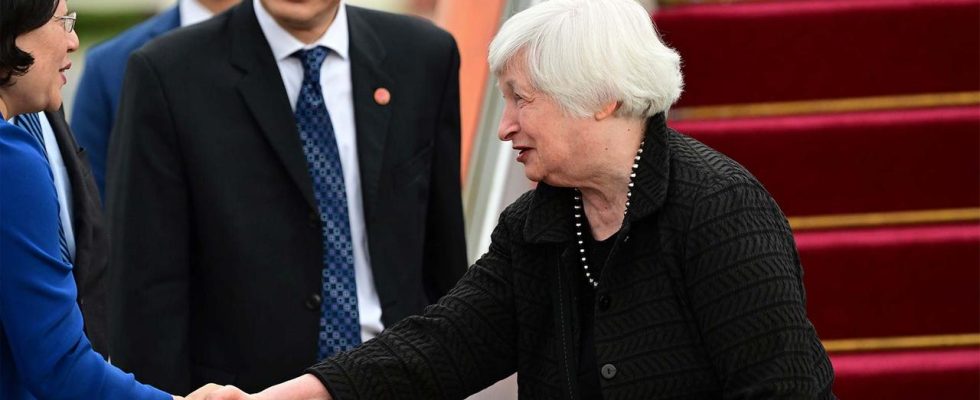US Treasury Secretary Yellen has arrived in Beijing amid tensions between the US and China. While she wants to smooth things over, automakers are already preparing for resource constraints.
At the beginning of her visit to China, US Treasury Secretary Janet Yellen called for better relations between the two great powers. “We seek healthy economic competition that benefits American workers and businesses, and we want to work together on global challenges,” Yellen tweeted shortly after arriving in Beijing.
Your journey offers an opportunity to communicate and avoid misunderstandings. If necessary, measures would also be taken “to protect our national security,” Yellen made clear.
What’s at stake
Relations between the world’s two largest economies had recently deteriorated noticeably. After the USA, among other things, restricted the export of high-performance chips and machines for their production, the government in China initially banned certain companies and organizations from using chips from the US manufacturer Micron. Finally, this week was followed by the announcement of export controls for certain raw materials for chip production.
The introduction of export licenses is a “well-thought-out hard blow” and “just the beginning,” said former Chinese Deputy Commerce Minister Wei Jianguo, an influential government adviser in Beijing. “If restrictions on China’s high-tech sector continue, countermeasures will escalate.”
Observers are now counting on Yellen to ease tensions. “If talks between the two sides go well, many restrictions could be eased,” said Liao Chien-yu, an analyst at Capital Securities. However, should the talks go badly, both sides could impose further sanctions after the US Treasury Secretary’s visit.
Western automakers are getting ready export controls before
Specifically, the export controls are about the rare earths germanium and gallium. However, the effects are still difficult to assess. With the escalating confrontation between the People’s Republic and the USA, companies around the world are looking for alternative sources of supply for important materials in order to reduce their dependency.
Western carmakers are preparing, for example, for the export restrictions on raw materials that are important for electromobility and digitization. At the request of the Reuters news agency, Volkswagen announced that it was assessing and monitoring the situation on the raw materials markets comprehensively in order to take measures together with partners if necessary. The goal is always to keep the impact on the production network as low as possible.
BMW also stated that the group was monitoring the situation and was in close contact with semiconductor suppliers. “We are currently not assuming any short-term effects on the supply situation,” said the Munich-based group. Volkswagen highlighted the importance of the affected critical raw materials for automobile production. Gallium and germanium are important resources, for example for light-emitting diodes or high-frequency applications, and will play a role in future autonomous driving functions.
Corporations emphasize China’s importance
The European-American carmaker Stellantis also warned against reducing its involvement in the People’s Republic. “I am not in favor of a complete decoupling from China,” said CEO Carlos Tavares. This would be neither realistic nor in the interests of Western companies. Stellantis is working with a number of Chinese companies, according to the Stellantis boss.
These include companies that use critical materials such as gallium and germanium for products that the car company buys from them. “We are not at war with any Chinese suppliers,” Tavares said. It is up to the European Union to work with the Chinese authorities to find a solution.
Volkswagen has also repeatedly emphasized China’s importance and warned against decoupling. The world’s second-largest car company finances a large part of its conversion to a software-based mobility provider from the profits generated in the People’s Republic.

